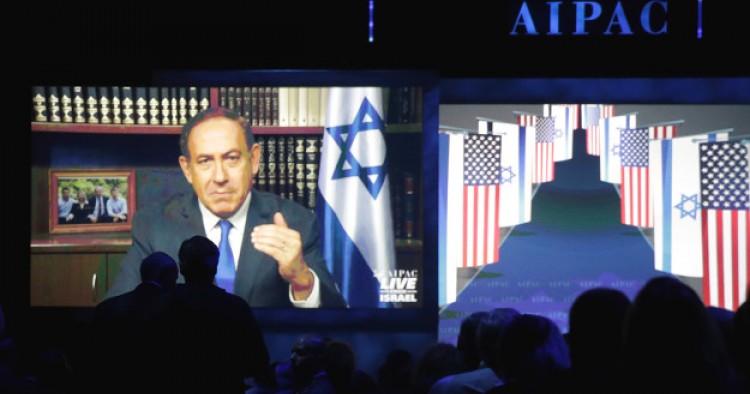In this week's Monday Briefing, MEI experts Yousef Munayyer, Eran Etzion, and Alex Vatanka provide analysis on recent and upcoming events including the evident partisan divide at this year's AIPAC Conference, the surprise that the Trump administration's lack of support for settlement building has caused for Israel's right wing, and Iranian President Rouhani's trip to Moscow.
Partisan Divide on Show at AIPAC Conference
Yousef Munayyer, MEI Scholar
The AIPAC gathering is routinely a who’s who of power in Washington, often featuring high-ranking speakers from the legislative and executive branch. This year’s gathering comes at a time of transition as the Trump administration settles into power after eight years of turbulent U.S.-Israeli relations under President Barack Obama.
The partisan divide is the biggest story in the U.S.-Israel relationship today and a strong undercurrent of the AIPAC conference. Perhaps the largest protests ever outside of an AIPAC gathering took place this weekend, which included progressive Jewish organizations out in full force. Likewise, the Israeli ambassador to the United States, Ron Dermer, himself a former Republican political operative, had strong praise for the Trump administration and a variety of other Republicans, while mentioning only one Democrat, Senator Bob Menendez. Menendez, a long time AIPAC ally, was the only Democrat on the Senate Foreign Relations committee to break ranks and vote for President Donald Trump’s nominee for ambassador to Israel, David Friedman, a man whose contempt for liberal Jews is seemingly only outdone by his contempt for Palestinian rights.
With the Iran nuclear deal here to stay, a reality accepted begrudgingly by Israel, the key item that has dominated AIPAC’s agenda in recent years has gone, bridging the partisan divide that they’ve helped produce to the fore. In the years to come, as Israel’s military occupation moves into its 51st year, this divide is only likely to grow while traditionally dominant groups like AIPAC will have little ability to bridge it.
AIPAC Conference and Broken Promises
Eran Etzion, MEI Scholar

On the surface, this week’s AIPAC conference will be a familiar sight. Thousands of activists and supporters will flock to D.C., listen to distinguished Israeli and American speakers, and finally, armed with the best pro-Israeli argumentation, will mount Capitol Hill to meet their elected officials. However, this year is anything but business as usual in D.C., and AIPAC too will face new challenges. Essentially, they are twofold: broken promises and a broken principle.
The Israeli Right, building on President Donald Trump’s campaign promises, had set an unrealistic high bar. The new administration was expected to authorize free expansion of settlements, annexation of at least parts of the Palestinian Territories, and move the U.S. embassy to Jerusalem. When none of these took place, collective disillusionment began to spread. It is still ongoing, and bound to dominate the conference’s corridors, if not its halls. To add to the confusion, Trump’s confidants dealing with Israeli issues, all of whom are known supporters of the settler movement, have been applying pressure on Prime Minister Benjamin Netanyahu to ‘restrain’ settlement activities. This policy line, which analysts are still trying unsuccessfully to explain, is of great concern to Israel. Campaign promises on the Iran nuclear issue have similarly been unceremoniously broken.
The Iran deal is also the source of the broken principle of bipartisanship, which once guided AIPAC. The D.N.C. is deeply scarred, and AIPAC will need to use all its ingenuity and resources to gradually regain its bipartisan credentials.
Rouhani in Moscow This Week
Alex Vatanka, Senior Fellow
President Hassan Rouhani is on a two-day trip to Moscow this week. Fifteen agreements are to be signed, and there is much—from trade and investment to regional security—on the table. Still, Syria will top the backstage agenda. President Vladimir Putin has for long maintained that Iran and Russia are in full agreement about the future of Syria. Not everyone in Tehran is convinced. An underlying fear in Tehran is that a blend of regional machinations is at work to marginalize Iran’s role in post-war Syria.
The Iranians have nervously looked on recent limited Russian-Turkish cooperation in Syria and wonder where it is heading. But it is Russia’s appetite for deal-making with the United States that concerns Iran the most. As Kayhan, a newspaper close to Supreme Leader Ali Khamenei put it, “Iran didn’t make so many sacrifices and offer so many martyrs in Syria for five years to allow it to become a chip in a deal between Moscow and Washington.” Such sentiments reflect deep Iranian unease.
Moscow is meanwhile irked by what it views to be Tehran oscillating between the West and Russia. In a recent incident, a Russian minister cancelled a trip to Tehran in anger over Iran’s bias for Boeing and Airbus over Russian-made aircraft. For all the reservations, there is no doubt that in the last few years the two countries have escalated efforts to build a durable alliance. This will be the ninth time Putin and Rouhani hold face-to-face talks. But while many dread the idea of a broader Iran-Russia axis, Moscow and Tehran still need to demonstrate that the budding ties rests on a strategic pivot and not a set of transactional deals.
The Middle East Institute (MEI) is an independent, non-partisan, non-for-profit, educational organization. It does not engage in advocacy and its scholars’ opinions are their own. MEI welcomes financial donations, but retains sole editorial control over its work and its publications reflect only the authors’ views. For a listing of MEI donors, please click here.















